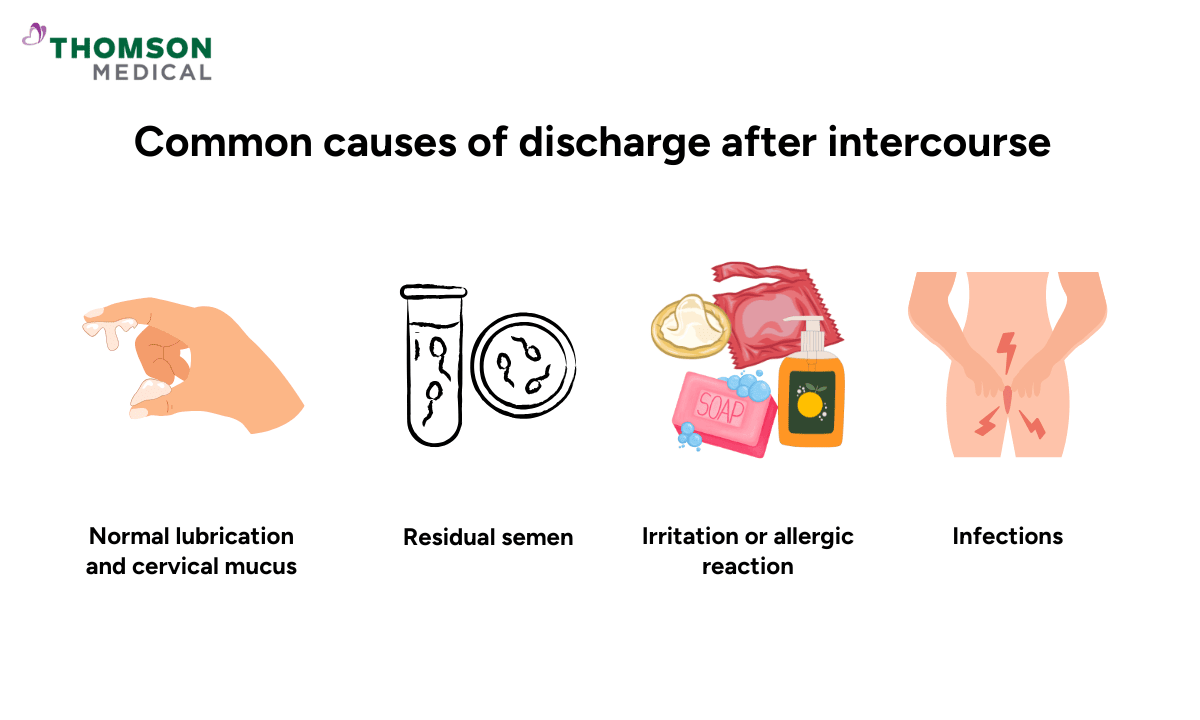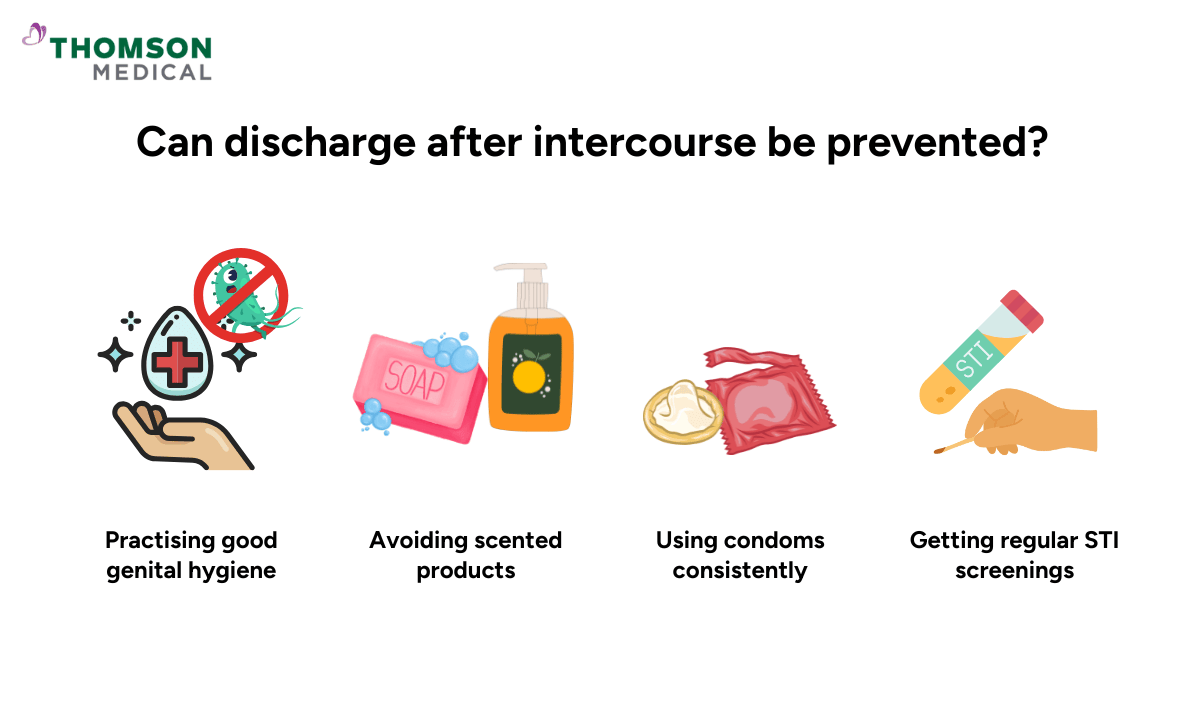Seeing discharge after intercourse can naturally make you pause and wonder what’s happening. You might also ask yourself, Is this normal? Could it mean something more? The good news is, most of the time discharge after intercourse is harmless. It’s simply your body’s response to arousal and activity. But, when it looks or feels unusual, it might point to irritation or infection that requires further examination.
What does discharge after sex mean?
Discharge after intercourse refers to any vaginal fluid or moisture that appears from the genital area following sexual activity. In women, this usually comes from the vagina, while in men, it may appear from the urethra (the tube that carries urine and semen).
It’s completely natural to feel concerned or unsure when you notice discharge after sex. This is because you may be worried that it could be a sign of something serious. However, the colour, texture, and smell of the fluid can provide helpful clues about whether it’s normal or if there’s an issue that requires further attention.
Is it normal to have discharge after sex?
Yes, having some discharge after intercourse is normal for most women. During arousal , the body produces vaginal discharge and cervical mucus (a slippery fluid from the cervix) to make intercourse comfortable. After intercourse, it’s normal for this fluid to mix with semen and leave the vagina.
In men, a small amount of clear or milky discharge may appear after ejaculation. This is usually just leftover semen or pre-ejaculate (fluid released before climax). Normal discharge is clear or whitish, mild-smelling, and shouldn’t cause any pain, burning, or irritation.
What are the common causes of discharge after sex?

Many factors can explain why discharge appears after intercourse. Knowing them can help you know when it’s normal and when to see a doctor.
Normal lubrication and cervical mucus:
These fluids protect the vaginal wall, keeping it moist and reducing friction during intercourse.
Hormonal changes during the menstrual cycle:
Hormones such as oestrogen affect the amount and texture of cervical mucus, making discharge thicker or clearer at different times.
Residual semen:
After intercourse, semen may leave the vagina naturally, which can look like cloudy or white discharge.
Irritation or allergic reaction:
Scented soaps, lubricants, or latex condoms may trigger vaginal irritation or mild inflammation (swelling and redness).
Infections:
Vaginal yeast infection caused by excess growth of yeast in the vagina, leading to thick white discharge that looks like cottage cheese and causes itching.
Bacterial vaginosis occurs when normal vaginal bacteria become unbalanced, causing thin grey discharge with a fishy smell.
Some sexually transmitted infections (STIs) like chlamydia, trichomoniasis, or gonorrhoea can cause discharge.
Other medical causes:
Pelvic inflammatory disease (an infection of the reproductive organs), cervical polyp, or vaginal atrophy (thinning of vaginal tissue after menopause) can also lead to discharge.
When should I be concerned about discharge after sex?
Occasional mild discharge is normal, but certain signs mean it’s time to see a doctor. You should seek help if the discharge shows any of the following characteristics:
Has a strong or unpleasant odour
Yellow, green, brown, or grey in colour
Causes itching, burning, or pelvic pain
Come with pain during urination or intercourse
Keeps coming back or changes suddenly
Our sexual health specialist
Loading...
Does discharge after sex differ between men and women?
Yes. After intercourse, women usually have natural fluids like cervical mucus, vaginal lubrication, or leftover semen. These are often clear or slightly white and harmless. The amount and texture can also change depending on where a woman is in her menstrual cycle.
For men, discharge is usually leftover semen or pre-ejaculate, which is a natural fluid produced during arousal. This is normal and harmless.
For both men and women, infections or irritation can change the colour, smell, or amount of discharge. If anything feels unusual, it’s best to speak with your doctor.
If you notice unusual changes in your vaginal discharge such as a different colour or smell, it’s important to have it checked early. Schedule an appointment with Thomson Medical, where our specialists can provide a thorough evaluation, identify any underlying issues, and recommend the most suitable treatment.
How is abnormal discharge after intercourse treated?
Treatment depends on the cause, so seeing a doctor for a proper diagnosis is important.
If it’s an infection:
Vaginal yeast infection is usually treated with antifungal creams or pills.
Bacterial vaginosis is treated with antibiotics, either by mouth or as a cream.
STIs are usually treated with antibiotics to get rid of the infection.
If it’s not an infection:
Irritation can be reduced by avoiding scented soaps, harsh chemicals, or products that cause redness. Use gentle, fragrance-free products.
Vaginal atrophy, which is thinning tissue after menopause, is sometimes treated with hormonal therapy, such as oestrogen creams, tablets, or rings.
If it’s a structural issue (physical change or growth in the reproductive organs):
Cervical polyps or other small growths can usually be removed safely with a medical procedure
Avoid using over-the-counter treatments without confirming your diagnosis first. This is because many vaginal conditions have similar symptoms but require different treatments. Using inappropriate treatment can make the symptom worse.
Can discharge after sex be prevented?

You can’t and shouldn’t stop normal discharge, since it plays an important role in keeping the vagina healthy. However, you can reduce the risk of abnormal discharge by:
Practising good genital hygiene
Avoiding scented products or harsh soaps
Using condoms consistently to prevent STIs
Getting regular STI screenings, especially if you have new or multiple partners
Having open discussions about sexual health with your partner
Using enough lubrication during intercourse to avoid vaginal irritation
These small steps can make a difference in maintaining comfort and risk of abnormal discharge after intimacy.
To help you reduce your risk of abnormal discharge and protect your sexual health, request an appointment with a healthcare professional at Thomson Medical. Our specialists can provide personalised advice on hygiene, safe intercourse practices, and maintaining overall reproductive health.
FAQ
What does discharge after sex look like?
In women, this discharge often looks clear or whitish, and it can feel a bit slippery or slightly sticky. That’s a normal mix of vaginal fluid, cervical mucus, and sometimes semen. In men, it’s usually clear or milky, often made up of leftover semen or natural fluid from the penis. It’s a healthy sign that your body produces enough moisture and cervical mucus for protection. However, if it turns yellow, green, grey, or smells bad, it might suggest infection.
Why do I have clear egg-white discharge after sex?
That’s often cervical mucus that helps sperm move through the cervix. That usually appears near ovulation (the time when your body releases an egg). You might notice it more after intercourse because sexual activity increases natural moisture. As long as it doesn’t smell bad or cause itching, it’s perfectly normal and shows your body is working as it should.
Why do I have jelly-like mucus after intercourse?
Jelly-like discharge can result from normal cervical mucus, vaginal lubrication, and semen. The thickness and texture of this discharge can change depending on where you are in your menstrual cycle. Hormones can make it thicker or more elastic at different times. However, if the mucus has a strange colour, a strong odour, or causes irritation, it might be due to an infection.
Why do I have coloured discharges after sex?
Yellow or green discharge could signal bacterial vaginosis or an STI such as chlamydia or trichomoniasis. Brown or pink discharge might happen after intercourse if there is light bleeding from the cervix or vagina. Grey discharge with a fishy smell may point to bacterial vaginosis, which occurs when the natural balance of bacteria in the vagina changes.
Can I get pregnant if I discharge after sex?
Yes, it’s still possible. The presence of discharge does not stop sperm from reaching the egg. In fact, cervical mucus plays an important role in helping sperm move through the reproductive tract during the fertile window of the menstrual cycle. If you are not planning to get pregnant, it’s important to use reliable contraception every time you have intercourse.
Can condoms throw off your pH balance?
No, condoms don’t throw off your pH balance. In fact, they can help protect it. By keeping semen (which is alkaline) from mixing with the vagina’s naturally acidic environment, condoms help maintain a healthy pH level. This reduces the risk of irritation and infections such as bacterial vaginosis (BV) or yeast infections.
The information provided is intended for general guidance only and should not be considered medical advice. For personalised recommendations and tailored advice based on your unique situations, please consult a specialist at Thomson Medical. Request an appointment with Thomson Medical today.
For more information, contact us:
Thomson Specialists (Women's Health)
Thomson Women's Clinic (TWC)
- Novena:
6592 6686 (Call), 8611 8986 (WA) - Bukit Batok:
6569 0668 (Call), 8686 3525 (WA) - Choa Chu Kang:
6893 1227 (Call), 8282 1796 (WA) Jurong:
6262 8588 (Call), 6262 8588 (WA)- Katong (female doctor):
6970 2272 (Call), 8611 9020 (WA) - Punggol:
6243 6843 (Call), 8811 0328 (WA) - Sembawang: 6753 5228
- Sengkang: 6388 8125
- Serangoon (female doctor): 6382 3313
- Tampines: 6857 6266
- Tiong Bahru: 6276 1525
